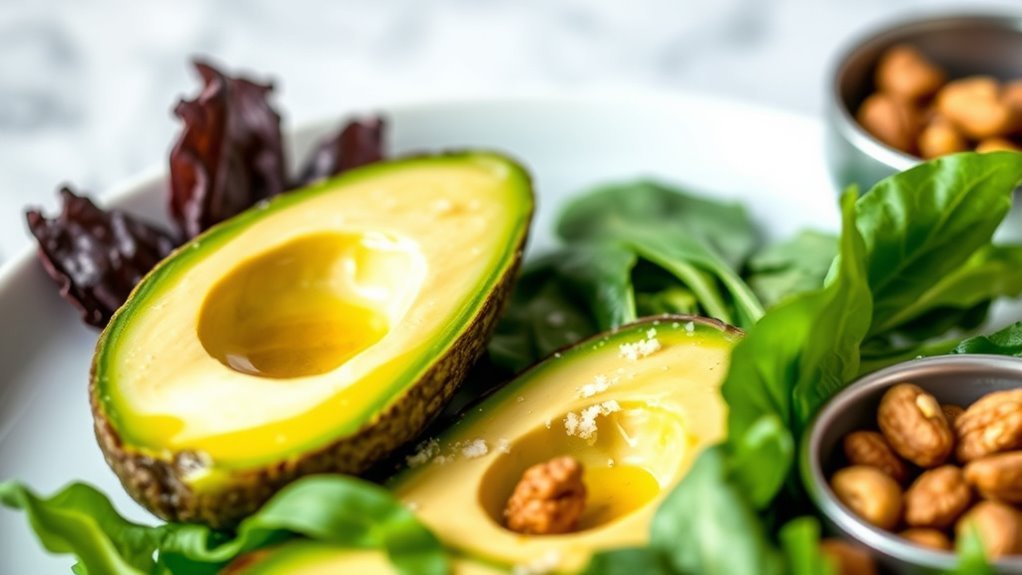On a ketogenic diet, you should aim for 20 to 50 grams of carbs per day to effectively enter and maintain ketosis. This low carb intake helps shift your body’s primary energy source from carbohydrates to fats, enhancing fat loss and increasing energy stability. Remember, individual factors like age and activity level may influence your ideal carb allowance. If you want to learn more about personalizing your diet, common mistakes to avoid, and more, keep exploring.
Understanding the Ketogenic Diet

When you immerse yourself in the ketogenic diet, you’re fundamentally shifting your body’s primary energy source from carbohydrates to fats. This change can offer numerous health benefits, including weight loss, improved mental clarity, and better blood sugar control. However, it’s important to be aware of common keto misconceptions. Many believe that all fats are harmful or that the diet is unsustainable long-term. In reality, healthy fats can support your body’s functions, and many people find keto to be a liberating way to eat. By understanding the principles behind the ketogenic diet, you can make informed choices that align with your health goals. Embracing this lifestyle can empower you to take control of your nutrition and well-being.
The Science Behind Carb Restriction

Carb restriction plays a vital role in the efficacy of the ketogenic diet, primarily by inducing a metabolic state known as ketosis. When you limit carbohydrate intake, your body shifts from relying on glucose for energy to burning fat stores instead. This shift markedly impacts carb metabolism, as your body becomes more efficient at using ketones produced from fat. Additionally, reduced carb intake lowers your insulin response, which is essential for fat loss and maintaining stable energy levels. With less insulin circulating, your body can tap into fat reserves more readily. Understanding these mechanisms empowers you to embrace the freedom that comes with a ketogenic lifestyle, allowing for sustained energy and weight management while enjoying a diverse range of foods.
Recommended Daily Carb Intake

When following a ketogenic diet, the standard recommendation for daily carb intake typically ranges from 20 to 50 grams. However, individual factors such as age, activity level, and metabolic health can greatly influence your specific needs. Understanding these guidelines and personal factors is essential for effectively managing your carb intake on keto.
Standard Keto Guidelines
While starting on a ketogenic diet, understanding the recommended daily carb intake is essential for achieving your health goals. Generally, most keto guidelines suggest limiting your carb intake to about 20-50 grams per day. This restriction encourages your body to enter ketosis, where it burns fat for fuel instead of carbohydrates. When it comes to keto meal planning, focus on low-carb vegetables, healthy fats, and adequate protein to stay within this range. Some individuals may incorporate carb cycling, allowing for occasional higher-carb days, but this should be approached cautiously to maintain ketosis. Ultimately, tailoring your carb intake to your personal needs and preferences is key to enjoying the freedom that a ketogenic lifestyle offers.
Factors Influencing Intake
Several factors can greatly influence your recommended daily carb intake on a ketogenic diet. Your individual metabolism plays a vital role, as everyone processes nutrients differently. Activity levels also matter; more active individuals may require slightly higher carb allowances to fuel their workouts. Health conditions can necessitate adjustments, especially if you’re managing diabetes or metabolic disorders. Age factors can impact how well your body responds to a keto diet, influencing your overall carb needs. Additionally, dietary preferences and lifestyle choices can dictate your carb intake. Hormonal influences, particularly for women, may also shift your requirements. Ultimately, finding the right balance for weight loss and overall well-being is key, so consider these factors when determining your specific carb limit.
Factors Affecting Carb Needs
Understanding the factors that affect your carbohydrate needs on a ketogenic diet is essential for achieving your health goals. Individual metabolic rates play a significant role, as they determine how efficiently your body processes macronutrients. Lifestyle factors, including fitness levels and activity intensity, also influence your carb requirements; more active individuals may need slightly higher intake. Age considerations can affect metabolism and hormonal balance, which in turn impacts carbohydrate needs. Additionally, your dietary preferences and any existing health conditions must be considered when tailoring your carb intake. By acknowledging these variables, you can create a ketogenic plan that aligns with your unique body and lifestyle, fostering greater freedom in your dietary choices while pursuing your health objectives.
How to Track Your Carb Intake
Tracking your carb intake is essential for maintaining ketosis and achieving your health goals. There are various methods available, from traditional food diaries to modern apps that simplify the process. Choosing the right tools can help guarantee accuracy and make your keto journey more manageable.
Tracking Methods Overview
Maintaining a successful ketogenic diet hinges on effectively monitoring your carbohydrate intake. You’ll find that tracking carbs can be done through various methods, allowing you to choose what fits your lifestyle best. Manual tracking using a food diary can help you become more aware of your eating habits, while digital options like spreadsheets offer more structured monitoring. Many people prefer using popular apps that simplify the process, allowing for quick input and instant feedback on your carb consumption. By consistently monitoring progress, you can adjust your intake as needed to stay within your carb limits. Ultimately, finding the right tracking method empowers you to embrace the keto lifestyle with greater freedom and confidence.
Recommended Tools and Apps
When it comes to effectively managing your carbohydrate intake on a ketogenic diet, utilizing the right tools and apps can make all the difference. Consider integrating a variety of resources that cater to your specific needs, from keto calculators to nutrition apps. Here’s a concise overview of recommended tools:
| Tool Type | Examples |
|---|---|
| Keto Calculators | MyFitnessPal, Carb Manager |
| Food Diaries | Cronometer, Lose It! |
| Fitness Trackers | Fitbit, Apple Watch |
| Meal Planners | Plan to Eat, Eat This Much |
| Recipe Finders | Wholesome Yum, Keto Connect |
Common Mistakes to Avoid
Although adopting a ketogenic diet can lead to significant health benefits, many people stumble into common pitfalls that can hinder their progress. Keto beginners often face carb confusion, especially when meal planning. Not managing sugar cravings can derail your efforts, particularly when eating out or dealing with emotional eating. Portion control is vital; overeating healthy fats can still lead to weight gain. It’s important to maintain nutrient balance by incorporating a variety of low-carb vegetables and proteins. Recipe swaps can help avoid boredom and keep you on track. By recognizing these common mistakes, you’ll empower yourself to navigate your keto journey with greater confidence and freedom, ensuring lasting success.
Delicious Low-Carb Foods to Enjoy
To thrive on a ketogenic diet, it’s crucial to embrace a variety of delicious low-carb foods that not only satisfy your taste buds but also support your nutritional needs. Here are some fantastic options to take into account:
- Keto friendly snacks: Almonds, cheese crisps, and guacamole.
- Low carb desserts: Sugar-free cheesecake and chia seed pudding.
- Savory meals: Zucchini noodles with pesto and grilled chicken.
- Vegetable options: Cauliflower rice and sautéed spinach.
- Protein sources: Eggs, fatty fish, and grass-fed beef.
Meal prepping can make grocery shopping easier, while quick recipes help you enjoy keto-friendly meals when dining out. Incorporating these foods guarantees you get healthy fats and stay on track without feeling deprived.
Adjusting Your Carb Intake Over Time
As you explore a variety of low-carb foods to support your ketogenic lifestyle, it’s important to contemplate how your carb intake might need to change over time. You may find that gradual adjustments are necessary as your body undergoes metabolic adaptation. Monitoring your personal tolerance to carbs will help you identify the right balance for your health goals. Consider incorporating carb cycling, where you adjust your carb intake on specific days, which can enhance energy levels and keep your diet dynamic. As you make lifestyle changes, tracking progress is essential to understand how your body responds. Listen to your body and be flexible, allowing your carb intake to evolve as you continue your keto journey.
Staying Motivated on Your Keto Journey
Staying motivated on your keto journey can feel challenging at times, especially when faced with cravings or the temptation to revert to old eating habits. Here are some strategies to help you stay on track:
- Find keto accountability partners to share your experiences and challenges.
- Implement meal prep strategies to simplify your weekly cooking and avoid last-minute temptations.
- Use mental resilience tips to strengthen your willpower when cravings hit.
- Practice positive mindset techniques to maintain a healthy perspective on your progress.
- Focus on celebrating small victories to boost your motivation and confidence.
Additionally, consider finding keto communities to connect with like-minded individuals and setting realistic goals to keep your expectations in check. These steps can empower you to overcome challenges and enjoy your keto journey.
Frequently Asked Questions
1. How many grams of carbs should I consume on a keto diet?
On a ketogenic diet, it is generally recommended to limit carbohydrate intake to about 20 to 50 grams of net carbs per day. Net carbs are calculated by subtracting fiber and certain sugar alcohols from total carbohydrates. This low intake is essential to encourage the body to enter and maintain a state of ketosis, where it primarily burns fat for fuel instead of carbohydrates.
2. Can I exceed 50 grams of carbs and still be in ketosis?
While some individuals may be able to consume slightly more than 50 grams of carbs and still maintain ketosis, this varies greatly from person to person. Factors such as age, metabolic rate, activity level, and individual insulin sensitivity play a significant role. It’s best to monitor your ketone levels using ketone testing strips or a blood ketone meter if you are experimenting with higher carb limits.
3. What types of carbs should I avoid on a keto diet?
On a keto diet, you should avoid high-carb foods such as grains (bread, pasta, rice), starchy vegetables (potatoes, corn), sugary snacks (candy, desserts), and most fruits (except for small portions of berries). Instead, focus on low-carb, high-fiber vegetables, healthy fats, and moderate amounts of protein to stay within your daily carb limits.
4. What are net carbs, and how do I calculate them?
Net carbs are the total carbohydrates in a food minus its fiber content and certain sugar alcohols (like erythritol). To calculate net carbs, use the formula: Net Carbs = Total Carbohydrates – Fiber – Sugar Alcohols. This calculation is important for those on a keto diet, as fiber does not significantly impact blood sugar levels and can be included in your daily carb count.
5. How can I track my carb intake on a keto diet effectively?
To effectively track your carb intake on a keto diet, consider using a food diary or a mobile app designed for tracking macros, such as MyFitnessPal or Cronometer. These tools allow you to log your food and see the nutritional breakdown, including total carbohydrates, fiber, and net carbs. Additionally, weighing your food and reading nutritional labels can help you stay accurate in your tracking, ensuring you remain within your desired carb limits.
References
- https://www.ncbi.nlm.nih.gov/pmc/articles/PMC6361138/
- https://www.health.harvard.edu/staying-healthy/the-truth-about-low-carb-diets
- https://www.cdc.gov/healthyweight/healthy_eating/dietary_guidelines.html
- https://www.webmd.com/diet/what-is-the-ketogenic-diet
- https://www.nutrition.gov/topics/nutrition-101/what-are-carbohydrates
- https://www.mayoclinic.org/healthy-lifestyle/nutrition-and-healthy-eating/in-depth/keto-diet/art-20459814
- https://www.verywellfit.com/what-is-the-keto-diet-4688230
- https://www.eatright.org/health/wellness/healthy-aging/the-ketogenic-diet-what-you-need-to-know
- https://www.healthline.com/nutrition/what-is-a-keto-diet
- https://www.clevelandclinic.org/health/diseases/17789-ketogenic-diet


